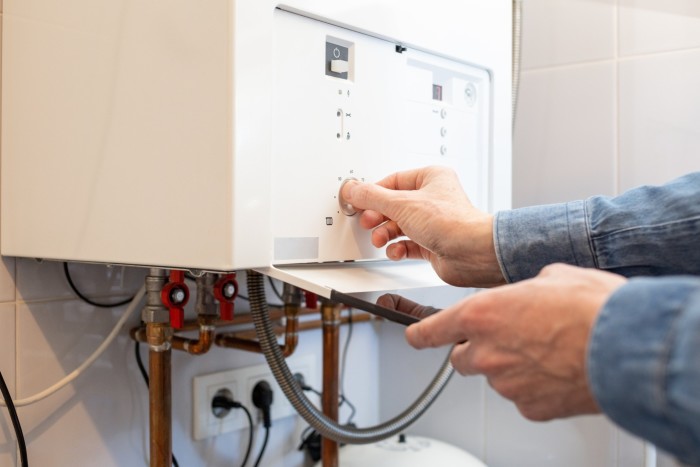Labour will not reverse Rishi Sunak’s changes to the phaseout of fossil fuel boilers, the party said on Thursday, in a sign of the acute political sensitivities around heating policy.
A spokesperson for Ed Miliband, the shadow climate secretary, confirmed the opposition party would follow Sunak in weakening UK targets for moving households to lower-carbon heating alternatives.
Labour’s decision not to challenge the Conservative prime minister’s weakened goals is in contrast to its pledge to reverse the government’s five-year delay on the ban on sales of new petrol and diesel cars.
The move highlights how fraught Britain’s move away from fossil fuel heating has become and mirrors the political challenges around net zero targets in other countries.
Sunak on Wednesday said he wanted “more clarity, not more emotion” in the debate around net zero as he threw out plans for tougher rules on energy efficiency; gave rural homes an extra nine years to ditch oil-fired boilers; and relaxed plans to phase out gas-fired boilers from 2035.
“To help those households for whom this will be hardest, I’m introducing a new exemption today so that they’ll never have to switch at all,” the prime minister said. The exemption would apply to roughly a fifth of households.
The way homes are heated in the UK needs a major overhaul. The majority of residential properties are hooked up to gas-fired boilers, with residential heating accounting for about 17 per cent of the country’s carbon footprint.

Replacing gas boilers is not straightforward, as it requires not only a different fuel but an overhaul of the surrounding infrastructure, as well as changes inside people’s homes.
Meanwhile, the debate around the merits of alternatives, such as hydrogen or heat pumps, has become increasingly polarised, with political consequences. In Germany, proposals to effectively ban new gas and oil boilers were watered down after a backlash caused a crisis for the government.
In a sign of the difficulties of finding alternative sources of heating, UK ministers in July scrapped plans to use Whitby, a village near the northern city of Chester, as a testing ground for hydrogen-fuelled heating after residents raised concerns about safety, upheaval and costs.
The government has also recently rowed back on plans to add a levy to pay for hydrogen directly on to energy bills, amid concern about the cost.
“Heating is the most difficult part of net zero,” said Guy Newey, chief executive of Energy Systems Catapult, a not-for-profit consultancy set up to help overhaul the energy system. “If you don’t come up with solutions people want, it’s not going to happen.”
The government has cast the revised targets as an effort to reassure households they will not be forced into measures they cannot afford, or that would be technically unfeasible.
Sunak has also increased the grant for households to replace boilers with heat pumps, from £5,000 to £7,500, and announced measures to speed up the development of new electricity networks, which are needed to boost the rollout of heat pumps.
However, industry critics warned that the changes sent a confusing message, just as investors are looking for clear direction.
“We are disappointed; it’s a backward step,” said Jenny Curtis, managing director at Swedish developer Vattenfall’s UK heat business, which is developing district heating networks using waste heat from, for example, industrial processes or data centres, and piping it to homes and businesses.
“It makes life harder for us and for our supply chain at a time when we need to quickly ramp up the skills base,” she said.
Others echoed her concerns about the impact of Sunak’s announcement on the supply chain.
“The prime minister’s green policy cull [ . . .] will starve businesses in the industry’s supply chain of the certainty they needed to invest, such as training more engineers in heat pump installation,” warned Mark Booth, managing director at housebuilder Hayfield.
Meanwhile, the government is pushing ahead with its consultation on planned quotas for boiler manufacturers to produce a certain number of heat pumps.

The policy has prompted fierce pushback from boiler manufacturers who argue they are being forced to produce heat pumps they cannot sell due to low demand. Now Sunak has rowed back on some of the measures designed to stoke demand.
The government’s target of 600,000 heat pumps per year being installed by 2028 also remains in place.
Mike Foster, chief executive of the Energy and Utilities Alliance, the trade group for boiler manufacturers, called Sunak’s pivot this week “rushed; it’s not been thought through”.
“It’s about a political message about not ripping out people’s gas boilers — when that was never the policy to begin with,” he added.
There is uncertainty for households, too. The ambition to phase out gas boilers after 2035 could still become a legal requirement, and it is unclear who will qualify for an exemption, raising the prospect of confusion.
There are also questions around who will pay for the cost of operating the country’s gas grid if only a small proportion of homes remain on the network.
“These questions are crucial and need to be thought about in the context of the whole system,” said Mark Wild, chief executive of Scotia Gas Networks.
“If there’s 100 houses in your street and ten of them go to heat pumps, we have to keep [the gas network] safe and operable for everyone . . . There’s no way of running a partial gas network,” he added.
Sunak insists his changes can be made without compromising the UK’s overall progress on cutting carbon emissions. But the Climate Change Committee, which advises the government on meeting those commitments, is not so sure. It said on Wednesday that the “announcement is likely to take the UK further away from being able to meet its legal commitments”, though it stressed it needed to examine the details further.
Greater emissions from heating would also need to be made up for by deeper cuts elsewhere if the UK was to meet its legal requirement to achieve net zero by 2050.
“The maths on net zero is pretty unforgiving,” added Newey.
However, some see Sunak’s announcement as a starting point for a wider debate around transforming domestic heating in the UK.
“This announcement reflects the reality that decarbonising housing is difficult, and that there are homes for which there isn’t currently a suitable solution,” said Rebecca Teasdale, a director at consultancy Baringa.
“The announcement should be taken as an opportunity — it highlights the need for more reflection by the government and industry to create a comprehensive plan for decarbonising residential heating.”













